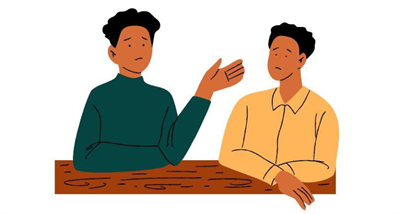It is the dreaded period of every parent’s life: parenting a teenager.
The teenage period is a time of tremendous growth. It spans from when students are barely out of primary school entering secondary school and ends as “young adults” deemed fit to make career choices that decide the course of their lives.
There are a lot of changes, even without the significant developments in their brains that affect their mood and behaviour. The combined stress of going through so many changes that are seen to be out of their locus of control often leads to the emotional conflicts that popularly characterise - and perhaps caricaturise - teenagers.
Among all this chaos, as a parent, you might be wondering how to do what is the best for your teen. You may have browsed hundreds of parenting websites; you may have had deep conversations with your fellow parents.
Have you ever asked your teen?
Though parenting may seem very lonely, with the brunt of the responsibility falling on your shoulders, it may be easy to forget parenting is actually a relationship at its core.
As such, here are three things that we have heard teenagers express that they would like their parents to know.
1. They would like to be treated with respect
As teenagers, most of their time is spent in school where their teachers waste no effort reinforcing the belief that they are “young adults” and should behave as such. In an age where they are expected to be more responsible, they also would like to be recognised similarly by being treated with respect. They would like for parents to be more honest and open in their communications with them, and give their teens’ voices and thoughts some weight, instead of dismissing them as pesky children.
It is true that teens “process information with the amygdala”, which plays an important role in regulating emotions in the brain, as opposed to adults who process information with the prefrontal cortex which oversees rational decision-making. According to an article by Stanford Medicine, “the connections between the emotional part of the brain and the decision-making centre are still developing” at an uneven rate, leading to teenagers experiencing significantly more “emotional input” that they cannot always rationalise or explain .

However, this does not mean that teens only make decisions purely based on emotions. They are capable of forming logical thoughts. In this age, they also tend to develop greater interest in the world around them, which further informs their perspectives and beliefs. As such, teens would like for their parents to recognise this and listen to their opinions with sincerity and take them seriously.
Moreover, they would greatly appreciate it if their parents could admit when they make mistakes. In their personal experiences, most parents prefer not to admit to the mistakes that they make in the relationship. For example, if a parent accidentally hurts their teen’s feelings during a heated argument, they hardly own up to it, and prefer to brush it off. However, teens would prefer that their parents admit their mistakes and apologise if necessary. This helps to reinforce positive behaviour, as well as the notion that making mistakes are only a natural part of being human.
By treating your teens with respect, parents show them that they are willing to put work into the relationship and that they value them. Most importantly, it would go a long way in fostering trust and security within their relationship, and so improve the quality of the relationship.
2. They would prefer to have conversations with you
They would prefer to have two-way conversations with you, rather than being on the receiving end of “lectures” and advice. As mentioned before, teenagers begin to form more independent and mature thoughts, which sparks a desire to have more balanced and engaging discussions with their parents.
Not only does this communication help you better understand your teen and vice versa, it is also a good way of spending quality time together as a family.
We go through many changes throughout our life, and our goals, ambitions, and priorities tend to change with the waves of time. These conversations help us learn of such important developments in each other’s lives.
Teenagers have also mentioned that when they make mistakes, they prefer to have honest and open discussion about their actions as opposed to receiving punishments. Scientifically, this helps to improve the connection between their emotional faculties and the decision-making regions of the brain (“Understanding the Teen Brain”). On a more personal level, teenagers note that this encourages them to be more forthcoming with their struggles and mistakes.
 3. They would like to be acknowledged and accepted
3. They would like to be acknowledged and accepted
Perhaps you mean to inspire them. Perhaps you mean to pressure them. Though it may be well-intentioned, the comparisons that parents make to the peers of their children, or even their siblings, often only increases the stress levels of teenagers.
Teens have admitted that such comparisons lower their self-esteem and make them less likely to confide in their parents. They feel as though their parents are telling them, “Your emotions do not matter,” when that may not be the intention.
What teenagers look for in their parents is acknowledgement and acceptance. During times of stress, such as exam periods, they would like for you to acknowledge their struggles and emotions. Often, they are not looking for answers, but just a listening ear to pour their heart to. This itself is a form of support that could give them the strength to face obstacles. These acts communicate to them that you recognise their struggles, and that they matter.

On top of that, they would like for you to accept them for who they are, and not pressure them to become who you want them to be. Teenagers would like for their parents to support their ambitions and desires. Again, this shows us that you respect them and recognise their individuality. Additionally, it improves their sense of self and self-worth.
Ultimately, what they really want you to know is that they highly value your support and love. Even if they may not express it, they are definitely grateful for all that you have done and are doing for them. They only wish that they can have more open communication with you, and that you would accept them and allow them to explore their identity.
We hope you find the suggestions in this article helpful.
If you require further support or would like to talk to one of us, please feel free to contact any of the counsellors at RGC via email:
[email protected].

Warmest regards,
The RGC team
References and Acknowledgements:
1. “Understanding the Teen Brain.” Stanford Medicine Children's Health, https://www.stanfordchildrens.org/en/topic/default?id=understanding-the-teen-brain-1-3051. Accessed 22 May 2023.
2. All images taken from Canva